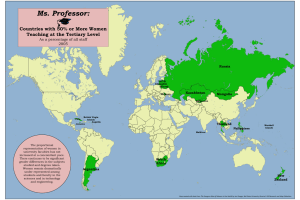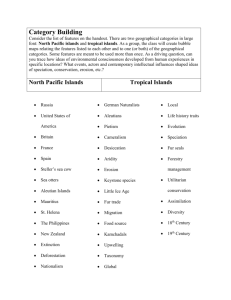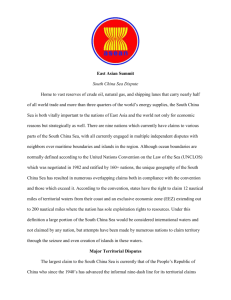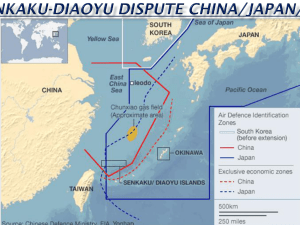ASIA Viewpoints: How serious are China-Japan tensions?
advertisement
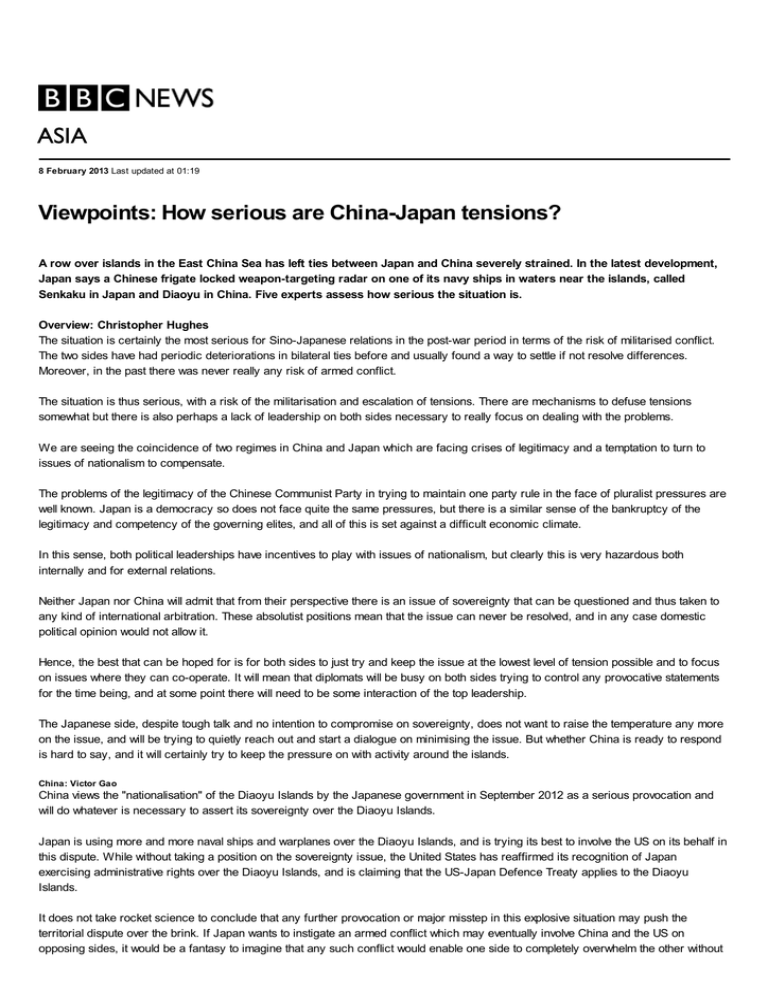
ASIA 8 February 2013 Last updated at 01:19 Viewpoints: How serious are China-Japan tensions? A row over islands in the East China Sea has left ties between Japan and China severely strained. In the latest development, Japan says a Chinese frigate locked weapon-targeting radar on one of its navy ships in waters near the islands, called Senkaku in Japan and Diaoyu in China. Five experts assess how serious the situation is. Overview: Christopher Hughes The situation is certainly the most serious for Sino-Japanese relations in the post-war period in terms of the risk of militarised conflict. The two sides have had periodic deteriorations in bilateral ties before and usually found a way to settle if not resolve differences. Moreover, in the past there was never really any risk of armed conflict. The situation is thus serious, with a risk of the militarisation and escalation of tensions. There are mechanisms to defuse tensions somewhat but there is also perhaps a lack of leadership on both sides necessary to really focus on dealing with the problems. We are seeing the coincidence of two regimes in China and Japan which are facing crises of legitimacy and a temptation to turn to issues of nationalism to compensate. The problems of the legitimacy of the Chinese Communist Party in trying to maintain one party rule in the face of pluralist pressures are well known. Japan is a democracy so does not face quite the same pressures, but there is a similar sense of the bankruptcy of the legitimacy and competency of the governing elites, and all of this is set against a difficult economic climate. In this sense, both political leaderships have incentives to play with issues of nationalism, but clearly this is very hazardous both internally and for external relations. Neither Japan nor China will admit that from their perspective there is an issue of sovereignty that can be questioned and thus taken to any kind of international arbitration. These absolutist positions mean that the issue can never be resolved, and in any case domestic political opinion would not allow it. Hence, the best that can be hoped for is for both sides to just try and keep the issue at the lowest level of tension possible and to focus on issues where they can co-operate. It will mean that diplomats will be busy on both sides trying to control any provocative statements for the time being, and at some point there will need to be some interaction of the top leadership. The Japanese side, despite tough talk and no intention to compromise on sovereignty, does not want to raise the temperature any more on the issue, and will be trying to quietly reach out and start a dialogue on minimising the issue. But whether China is ready to respond is hard to say, and it will certainly try to keep the pressure on with activity around the islands. China: Victor Gao China views the "nationalisation" of the Diaoyu Islands by the Japanese government in September 2012 as a serious provocation and will do whatever is necessary to assert its sovereignty over the Diaoyu Islands. Japan is using more and more naval ships and warplanes over the Diaoyu Islands, and is trying its best to involve the US on its behalf in this dispute. While without taking a position on the sovereignty issue, the United States has reaffirmed its recognition of Japan exercising administrative rights over the Diaoyu Islands, and is claiming that the US-Japan Defence Treaty applies to the Diaoyu Islands. It does not take rocket science to conclude that any further provocation or major misstep in this explosive situation may push the territorial dispute over the brink. If Japan wants to instigate an armed conflict which may eventually involve China and the US on opposing sides, it would be a fantasy to imagine that any such conflict would enable one side to completely overwhelm the other without quickly escalating from a conventional war to a non-conventional war. As the three largest economies in the world, the US, China and Japan have nothing to gain and everything to lose in such an armed conflict, and the world at large would suffer disastrous consequences. Therefore it is time for greater courage, wisdom and vision to prevent any further escalation of tension between China and Japan over the Diaoyu Islands, and it is time for building greater peace, stability and reconciliation in Northeast Asia. However, some people who do not have adequate knowledge of the complexities of the dispute may view China and Japan as just another pair of countries embroiled in a standard territorial dispute. But the reality is quite different. Imperial Japan was a die-hard ally of Nazi Germany in the Axis of Evil in the Second World War, and unconditionally surrendered to China and other allied countries in 1945. The political existence of the post-WWII Japan will be challenged if it dares to disregard the Cairo Declaration [which states Japan shall be stripped of all territories seized from China] and the Potsdam Declaration [which says "Japanese sovereignty shall be limited to the islands of Honshu, Hokkaido, Kyushu, Shikoku and such minor islands as we determine"], and challenges the post-WWII international security order. Japan could be a better country, and the Japanese nation a greater nation, if it had the political courage and wisdom as Germany and the German nation have demonstrated, in dealing with their WWII responsibilities. Japan: Tetsuo Kotani The situation around the Senkaku Islands is very dangerous. There is no territorial dispute as legally defined, since China's claims over the islands have no consistency or legal grounding. This is why China is attempting to change the territorial status quo by force. China successfully took control of the Scarborough Shoal in the South China Sea from the Philippines last year by sending paramilitary ships to the shoal. But this will not work vis-a-vis Japan since the Japan Coast Guard is much more capable. China's seamanship is immature and its paramilitary ships sometimes lose manoeuvrability in the rough waters around the Senkakus. Its military has also taken provocative action such as pointing missile radar at Japanese ships and aircraft. As such, the possibility exists of accidents and escalation. Japan has no intention of escalating the situation and is responding with restraint, while keeping communication channels open. It is China's responsibility to explain why it kept silent about the islands for 76 years between 1895 and 1971. There are even documents and maps in which China acknowledged the islands as Japanese territory. China should stop challenging Japan's legitimacy by force and adopt peaceful means. If China wishes to settle this in court, the Japanese government would accept the challenge in accordance with international law. In doing so, however, China must be prepared to accept the ruling, even if it is not in China's favour. It is very difficult to foresee any "solution" as the question is not about ownership of small islands. It is not about territorial or resource nationalism either. Behind China's hard-line stance on the islands lies its anti-access/area-denial (A2/AD) strategy. A2/AD rests on wide-ranging ocean surveillance to detect and locate approaching enemy forces. Primary A2/AD weaponry includes a large submarine fleet and land-based aircraft carrying anti-ship cruise missiles. Anti-ship ballistic missiles to target moving ships might be added in the near future. This is why China claims almost all the waters in the East and South China Seas and the Yellow Sea - to conduct ocean surveillance while blocking foreign surveillance activities. If China adopts peaceful ways to make its claims, I believe Japan and China can manage the confrontation over the islands and ease tensions. But that would require a huge change in China's strategic thinking. United States: Richard Bush Maritime East Asia is becoming increasingly dangerous. The past 12 months have seen a series of crises and spats in the East China Sea and South China Sea that threaten to spin out of control. The United States risks becoming entangled in conflicts among countries that are its friends and partners. China, Taiwan and Japan each claim the Diaoyu/Senkaku Islands northeast of Taiwan while China, Taiwan and several Southeast Asian countries claim various land forms in the South China Sea. Behind these claims is an intensifying contest for hydrocarbon, mineral and fishery resources. Conflicts have become more intense in recent years because China is acquiring the seaborne capabilities to assert its own claims and challenge those of others. Growing nationalist sentiment in all countries exerts pressure on leaders to take strong stands and eschew compromise. The capacity of each of these governments to conduct crisis management is modest at best. Domestic nationalism weakens that capacity even further. The proximate source of the current danger is how the countries seek to promote their claims through the operations of their maritime agencies. Clashes and standoffs are growing more common. Although no incident has crossed the threshold of loss of life, that may be only a matter of time. Clashes at any level are not in the US interest, because they force the United States to choose among countries with which it seeks good relations. Washington will continue to counsel restraint among the contenders (China has deservedly become the main target). But the United States has both the need and the opportunity to facilitate through quiet diplomacy a reduction in the probability of physical clashes and the attendant tensions. The goal should be to encourage the countries concerned to regulate the operations of their maritime agencies through the adoption of conflict-avoidance mechanisms and institutionalised risk-reduction measures. Asean: Lye Liang Fook The manner in which the Diaoyu/Senkaku Islands dispute has unfolded between China and Japan has implications for Asean's [Association of Southeast Asian Nations] relations with China. Asean, comprising 10 smaller countries, witnessed China adopting various measures in response to Japan's nationalisation of the islands. Besides their continued air and sea tussles near and over the islands, China has apparently tightened the economic screws on Japan. Japanese imports to China have dropped and Japanese businesses, especially its car manufacturers, have seen their sales in China plummet. The fear by individual Asean countries is that Beijing would readily leverage on their growing economic dependence on China to force them to back down on issues Beijing considers to be in its national interests. Already, the Philippines has found itself reeling from China's wrath due to their differences over the Scarborough Shoal/Huangyan Island in the South China Sea. What started out innocuously as illegal poaching by Chinese fisherman in waters off the shoal in April 2012 soon developed into a stand-off at sea that lasted several weeks. Simultaneously, Philippine exports to China were subjected to more stringent checks and Chinese nationals were advised against visiting the Philippines. Most interestingly, while Philippine government vessels have withdrawn from the shoal area in an agreement reportedly struck by both sides in June 2012, the Chinese governmental vessels have apparently yet to comply. In this stand-off, the Philippines blinked first. Although China appears to have won this "battle" over the shoal, this may turn out to be a pyrrhic victory. Given its heft, China would lose much credibility in Asean if it persists with this "hard" approach. Instead, Asean would like China to pursue an outcome based on "mutual benefit" and "mutual respect", to use China's own diplomatic language. This would entail China sitting down with Asean claimant states and perhaps even Asean as an association to devise a way to manage their differences. By making progress through talks, China can reaffirm its peaceful development message to its smaller neighbours. China can also minimise the involvement of third parties not directly involved in the territorial disputes. More Asia stories North Korea confirms nuclear test [/news/world-asia-21421841] North Korea says it has successfully carried out its third nuclear test, a widely anticipated move that has drawn international condemnation. US veteran honoured for Afghan battle [/news/world-us-canada-21415533] India removes corruption prosecutor [/news/world-asia-india-21421977] BBC © 2013 The BBC is not responsible for the content of external sites. Read more.


